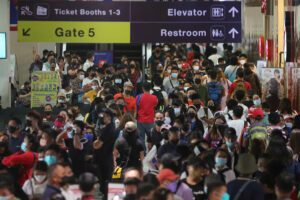PHILIPPINE President Ferdinand R. Marcos, Jr. declared more long weekends for 2023 to boost the country’s tourism recovery, a strategy based on the “holiday economics” policy implemented during the Arroyo administration.
“[There] is a need to adjust these holidays pursuant to the principle of holiday economics wherein a longer weekend will help encourage domestic travel and increase tourism expenditures in the country,” Mr. Marcos said in Proclamation No. 90, which declared Jan. 2, a Monday, as a special non-working holiday.
“For the year 2023, New Year’s Day falls on a Sunday. In consideration of the Filipino tradition of visiting relatives and spending time with their families for this occasion, it is but fitting to declare January 2 as an additional special (non-working) day throughout the country,” the proclamation read.
Mr. Marcos also declared Nov. 2 (Thursday) as an additional non-working holiday.
Special non-working days in the proclamation also include Feb. 25 (Saturday), EDSA People Power Uprising Anniversary; Apr. 8, Black Saturday; Aug. 21 (Monday), Ninoy Aquino Day; Nov. 1 (Wednesday), All Saints’ Day; Dec. 8 (Friday), Feast of the Immaculate Concepcion; and Dec. 31 (Sunday), Last Day of the Year.
The no-work, no-pay policy covers special non-working holidays unless there are company rules or agreements “granting payment on a special day,” according to a Labor department order.
Employees asked to work on a special non-working day should be paid 30% more of their daily pay for the first eight hours of work. Workers who work overtime should receive 30% more of their hourly rate. On the other hand, workers who don’t work on regular holidays get paid. Those who work are paid 200% of their regular rate.
Meanwhile, regular holidays are Jan. 1 (Sunday), New Year’s Day; Apr. 6, Maundy Thursday; Apr. 7, Good Friday; Apr. 10 (Monday), Araw ng Kagitingan; May 1 (Monday), Labor Day; Jun. 12 (Monday), Independence Day; Aug. 28 (Monday), National Heroes Day; Nov. 27 (Monday), Bonifacio Day; Dec. 25 (Monday), Christmas Day; and Dec. 30 (Saturday), Rizal Day.
This year, Mr. Marcos declared the eve of All Saints’ Day, Oct. 31, a special non-working holiday in line with his tourism push.
However, the recent long weekend holiday wasn’t good for many Filipinos, including owners of tourism businesses, as a powerful typhoon caused massive floods and landslides across a large area of the country and killed more than a hundred. — Kyle Aristophere T. Atienza
